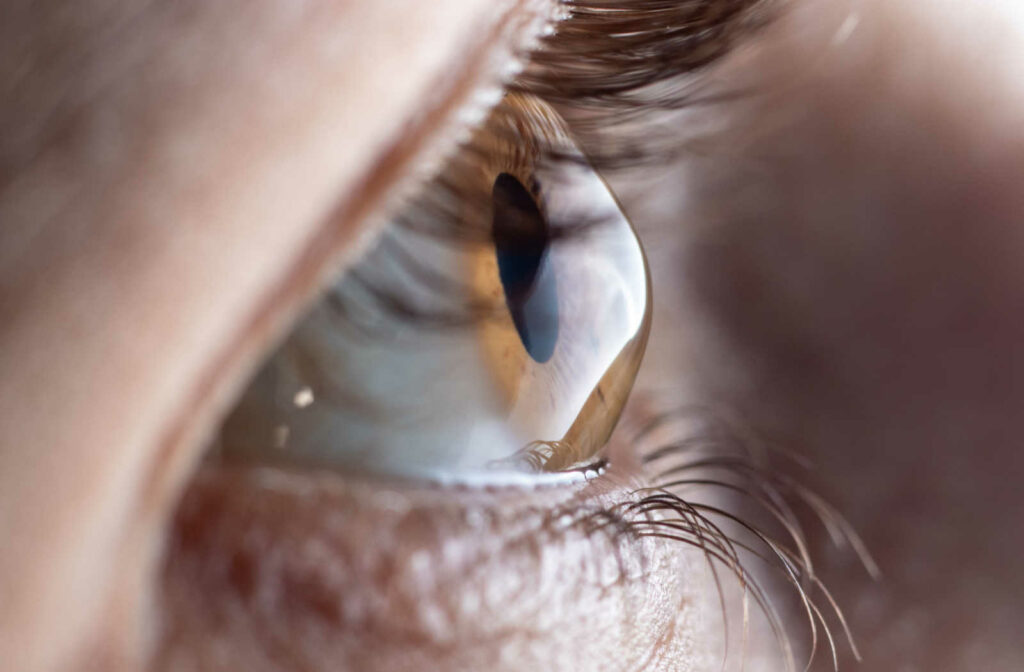Contact lenses can be a great alternative to wearing prescription glasses for some people. Although, not everyone can wear them comfortably. Eye conditions, such as dry eye disease or blepharitis, may make wearing contacts uncomfortable and risky. A severe refractive error, allergies, or contact lens intolerance can also make wearing contact lenses difficult.
Fortunately, some treatments can allow you to wear contacts comfortably. The reason you’re having trouble wearing the lenses will determine how your doctor will go about creating a contact lens solution plan for you.
Possible Reasons You Can’t Wear Contact Lenses
Can Everyone Wear Contact Lenses?
Because a contact lens sits directly on the eye, there are several things to consider. Some require treatment to wear contacts, whereas others may simply need a different type of lens for proper fitment. Your eye doctor will determine if you are a candidate for contact lenses and what type of lens is right for your unique eyes.
Dry Eye Disease
Dry eye disease, commonly known as dry eye, is a common reason someone cannot wear contact lenses or is limited in which ones they can wear. Regardless of the subtype of dry eye, the primary symptom is dry eyes.
Because a contact lens sits directly on the eye, a person with severe, untreated dry eye may not be eligible for contact lenses.
Potential Solution:
Treating dry eye symptoms is typically the best solution if they prevent you from wearing contacts. Even after being treated, the symptoms of chronic dry eye may return. A scleral lens is a specialty contact lens that may be an option, even with the presence of severe dry eye.
Severe Eye Allergies
Eye allergies can be a bit of a double-edged sword. On the one hand, the allergies themselves can make wearing contact lenses difficult. The allergens that cause your reaction can become stuck on the lens, which leads to continued allergy attacks.
On the other hand, a common side effect of many allergy medications is dry eyes. So, if you’re treating allergies, it’s important to use medication without that side effect.
Potential Solution:
If medication is an option to treat your allergies without drying out your eyes, that’s a good option. Otherwise, a daily disposable contact lens may be ideal. This way, the chances of reintroducing allergens are minimized.

Severe Refractive Error
A severe refractive error like astigmatism or a condition like keratoconus (a bulging cornea) could prevent a person from wearing a standard soft or hard contact lens. Even with these problems, there could still be a way to wear contacts. Your eye doctor may suggest an alternative type of contact lens.
Potential Solution:
Without surgery, you cannot typically change a refractive error or the eye’s shape. However, specialty contact lenses, like scleral or toric lenses, may be options in some cases.
Contact Lens Intolerance
Unfortunately, sometimes our bodies simply don’t do well wearing contact lenses. Deposit buildups, lens material, humidity, and your body’s immune system can all contribute to how comfortable you are wearing contact lenses.
Potential Solution:
To find a solution for contact lens intolerance, your eye doctor will have to figure out what your eyes are reacting to. This may or may not be possible; discussing the options with the optometrist is your best bet.
Untreated Blepharitis
While it’s not typically a permanent reason to prevent contact lens wear, an eye condition like blepharitis could delay wearing contacts. This condition shares many symptoms with dry eye disease and is connected to evaporative dry eye because it can result from meibomian gland dysfunction.
Potential Solution:
Blepharitis won’t necessarily require a different type of contact lens. If it’s a recurring problem, your eye doctor will likely want to address it before recommending contacts. Alternatively, suppose the condition clears up quickly with treatment. In that case, there shouldn’t be a reason not to use whichever contact lens feels the best.
Signs You Could be Wearing the Wrong Contact Lens
To avoid any potential problems from wearing improperly fitting contact lenses, it’s important to pay attention to how your eyes feel when wearing them. Some of the signs you could be wearing the wrong contact lenses for your eyes include:
- Hypoxia
- Infection
- Dry eyes
- Allergic reactions
- Abrasion on your cornea
Discuss Your Contact Lenses With Your Eye Doctor
During a contact lens exam and fitting, your eye doctor takes all the necessary measurements to direct you toward the best contact lens for your eyes. For example, they could determine you have severe astigmatism in one or both of your eyes during the exam. Information like this helps them give the best recommendations.
Contact us at Pack & Bianes Optometry today and book a contact lens exam. After the exam, our eye doctor can review all your options with you and get you a trial pair of contact lenses to go home with.



